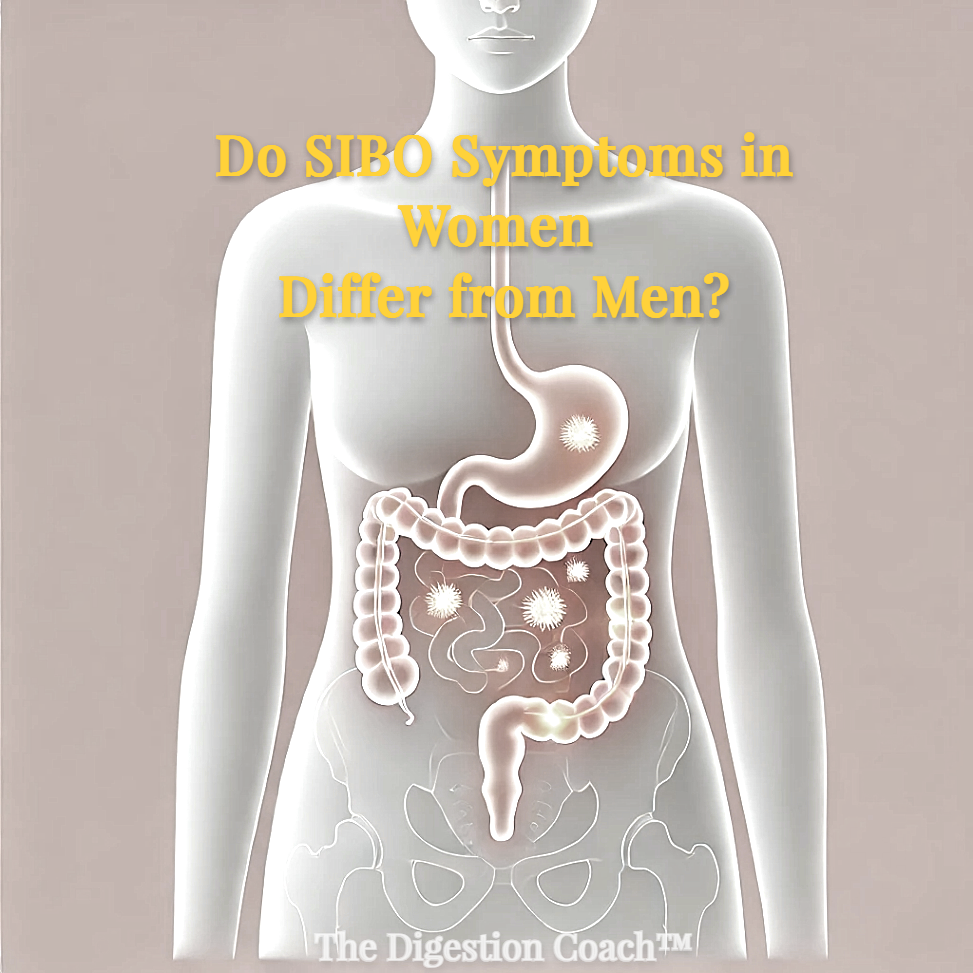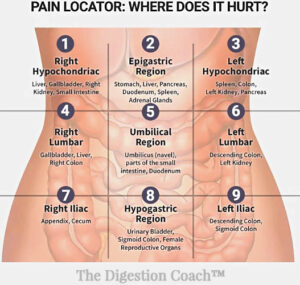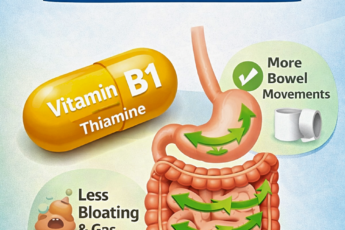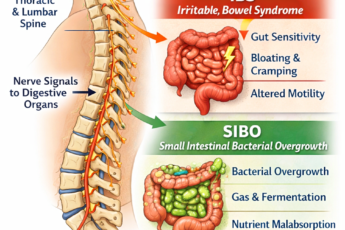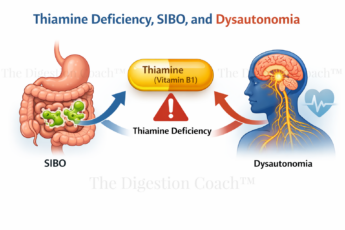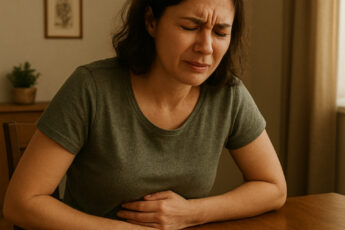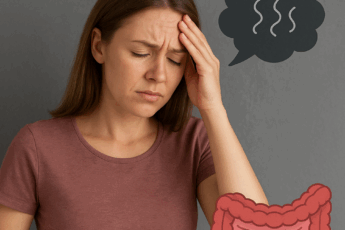Small Intestinal Bacterial Overgrowth, or SIBO, is a condition where excessive bacteria in the small intestine disrupt digestion, leading to uncomfortable SIBO symptoms in women and men, like bloating, abdominal pain, diarrhea, and more. With SIBO diagnoses on the rise, a common question emerges: Do SIBO symptoms in women differ from those in men? While the core mechanics of SIBO don’t vary by sex, subtle factors might influence how symptoms manifest or are perceived. In this article, we’ll explore whether SIBO effects in females diverge from those in men, focusing on bloating and abdominal pain, which are key concerns for digestive health in women.
Are SIBO Symptoms Different for Women vs. Men?
At its root, SIBO operates the same way in everyone: bacteria ferment undigested food, producing gas and triggering inflammation. This leads to a familiar lineup—bloating, abdominal pain, diarrhea, constipation, malabsorption, and brain fog—that studies show affects men and women similarly. No large-scale research points to biological differences in how SIBO symptoms in women or men present based on sex alone.
That said, a few factors can create variations in experience:
- Hormonal Influences: Women’s hormonal cycles—particularly fluctuations in estrogen and progesterone—can affect gut motility. During menstrual phases, slower digestion might amplify SIBO effects in females, like bloating or discomfort, though this isn’t exclusive to SIBO.
- Comorbid Conditions: Women are more likely to have overlapping conditions like irritable bowel syndrome (IBS) or endometriosis, which can mimic SIBO or make symptoms feel more complex. These conditions don’t change SIBO but may shape how women perceive or report discomfort.
- Behavioral Differences: Women tend to seek healthcare for digestive health issues more often than men, potentially leading to earlier diagnosis or more detailed symptom descriptions. Men might underreport symptoms, which can skew perceptions of severity.
While these factors suggest slight differences in how SIBO might be experienced, the condition’s fundamental symptoms remain consistent across sexes. Let’s take a closer look at two common complaints—bloating and abdominal pain—to see if they shed more light on this question.
Bloating: A Universal SIBO Struggle?
Bloating, reported by 70-90% of SIBO patients, is the sensation of fullness or abdominal distension caused by excess gas from bacterial fermentation. Whether you’re a man or a woman, eating high-carb meals can trigger bacteria to produce gas, leading to that tight, swollen feeling—often worse after eating, a key SIBO symptom in women and men.
For women, bloating might feel more pronounced at certain times. Hormonal shifts during the menstrual cycle can slow gut motility, potentially trapping gas and exaggerating distension. This doesn’t mean SIBO effects in females are inherently worse—it’s more about timing. For example, premenstrual or menstrual phases might make bloating feel more intense, even if the bacterial activity remains unchanged. Men, on the other hand, tend to experience bloating more consistently without cyclical peaks. But there’s no evidence that the bloating itself—its cause or severity—differs biologically between sexes. Body composition or personal sensitivity might play a more significant role than gender in how bloating is perceived.
Abdominal Pain: Does Sex Change the Sensation?
Abdominal pain, affecting 50-80% of SIBO patients, ranges from cramping to aching or sharp sensations, often tied to gut inflammation, spasms, or distension. Like bloating, the mechanism behind this SIBO symptom in women and men doesn’t vary by sex—bacteria irritate the gut lining, and the body responds with discomfort.
Yet, women might describe pain differently due to external factors. For instance, women are more likely to have visceral hypersensitivity, a heightened pain response seen in conditions like IBS, which often overlaps with SIBO. This could make abdominal pain feel more intense, though it’s not a direct result of SIBO effects in females being “different.” Additionally, conditions like endometriosis, exclusive to women, can mimic or coexist with SIBO, complicating the pain picture. Men might experience similar pain but could underreport it due to cultural habits, though no data suggests their SIBO pain is mechanistically unique.
Ultimately, the type, location, or triggers of abdominal pain in SIBO—whether crampy after meals or diffuse throughout the day—depend more on individual factors like diet, stress, or SIBO severity than on being male or female.
Dr. Ettinger’s Expertise: Understanding Digestive Health in Women, SIBO, and Beyond
For over 30 years, I’ve dedicated my practice to optimizing digestive health in women and helping women overcome GI health conditions like irritable bowel syndrome (IBS) and SIBO. As a SIBO specialist, I’ve worked closely with hundreds of women to address the bloating, abdominal pain, and distress that disrupt their lives. My deep understanding of women’s unique needs—especially when it comes to conditions causing stomach bloating and abdominal pain—sets my approach apart.
SIBO is often a piece of a larger puzzle. While it’s a key driver of painful and annoying digestive symptoms, other digestive issues or even combinations of conditions can contribute to discomfort. My decades of clinical experience and robust knowledge of biology and physiology allow me to unravel these complexities. Unlike the plethora of online digestive health coaches who may rely on trends or limited training, I bring a nuanced perspective honed by real-world results. Whether navigating hormonal impacts on gut health or distinguishing SIBO from overlapping conditions like endometriosis, my expertise ensures that women receive tailored, effective care beyond surface-level solutions.
What Does This Mean for SIBO Sufferers?
So, do women experience SIBO differently? Not in a fundamental sense—SIBO’s biology doesn’t discriminate by sex. Bloating and abdominal pain, two disruptive SIBO symptoms in women, arise from the same bacterial misbehavior in everyone. However, SIBO effects in females might feel more acute during hormonal shifts or due to overlapping health conditions, while men might experience them more steadily but report them less. These nuances don’t change SIBO’s core but can shape how it feels from day to day.
If you’re navigating SIBO, whether male or female, tracking symptoms alongside diet, stress, or life changes (like menstrual cycles) can help pinpoint triggers. Consulting a SIBO specialist to rule out conditions that mimic SIBO, like endometriosis in women or other gut disorders, is also key to getting the proper care. With the right guidance, like the specialized support I’ve provided for decades, you can move beyond symptoms and reclaim your digestive health and beyond.
COMPLEMENTARY 15-MINUTE CALL
Take your first step toward a renewed sense of well-being. Call today to arrange a complimentary 15-minute consultation.
Let’s discern whether my approach aligns with your needs.
I look forward to connecting with you at 714-639-4360.
